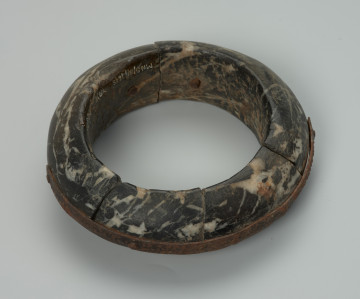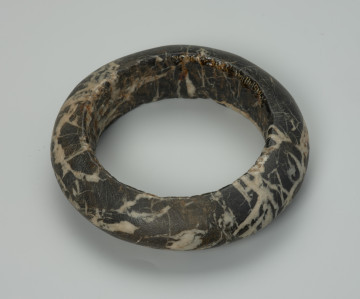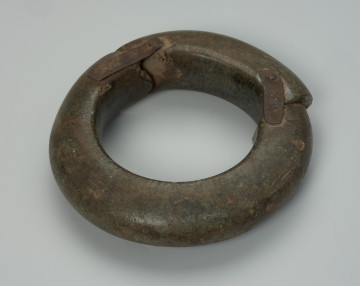
Men's bracelet
między 1930 — 1940
National Museum in Szczecin
Part of the collection: Collection of Dogonian art
The stone bracelet used to be worn by the Dogon men on the forearm. The Dogon people usually store old, unused bracelets in broken pots in a granary. In a Dogon family, every man and woman have such a granary for personal belongings. Stone is a well-known material used by the Dogon in crafts and in worship. The Dogon believe in Amma - the creator god, but many cults are characteristic of them, including the cult commemorating mythical ancestors called binu. The priest of binu is binukedine, which means companion or helper of the ancestor Binu. The binukedine wears dugo (also called duge) stones around his neck, which are the link between deceased ancestors and modern descendants, which is why he is also called the master of stones. The binu cult is associated with plant vegetation and human fertility. Binukedine is primarily concerned with making offerings, which is especially important during the agricultural season. A prayer accompanies the offering, an example of which is the recitation addressed to the stones carried by the priest: ‘Amma be greeted! After Amma, the Earth be greeted! After the Earth, the Stone be greeted! After the Stone, the Stones (great totems) be saluted! After the Stones (great totems), the Stones (lesser totems) be saluted!’. The Dogon most probably acquired the bracelet in question from the Tuareg - a pastoralist people inhabiting the Sahara and the borderlands of the Sahel (Algeria, Libya, Niger, Mali, Burkina Faso), who cut it from a uniform stone and shaped it using a simple lathe. Tuareg men called bracelets of this type ahbeg and wore them on the arm, just above the elbow. They were not specially smoothed on the inside to prevent them from slipping off the arm. Ahbegs were given to young men together with swords and served as defensive weapons.
Katarzyna Findlik-Gawron
Author / creator
Dimensions
cały obiekt: height: 3,1 cm, diameter: 11,9 cm
Object type
body adornment, jewellery
Creation time / dating
Creation / finding place
Identification number
Location / status

między 1930 — 1940
National Museum in Szczecin

między 1930 — 1940
National Museum in Szczecin

między 1930 — 1950
National Museum in Szczecin
DISCOVER this TOPIC
National Museum in Lublin
DISCOVER this PATH
Educational path